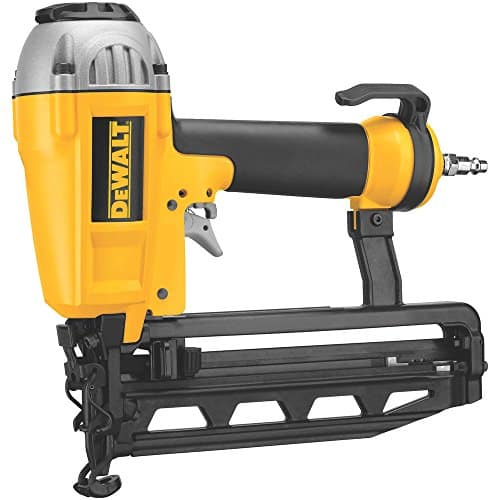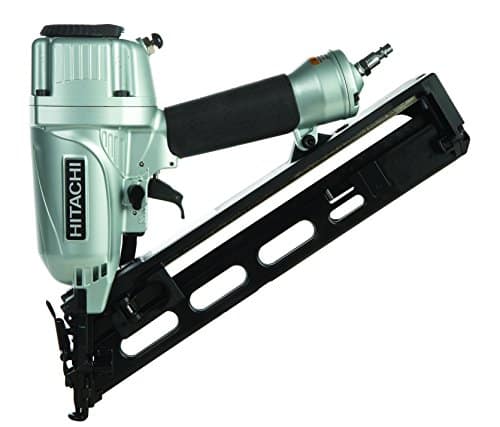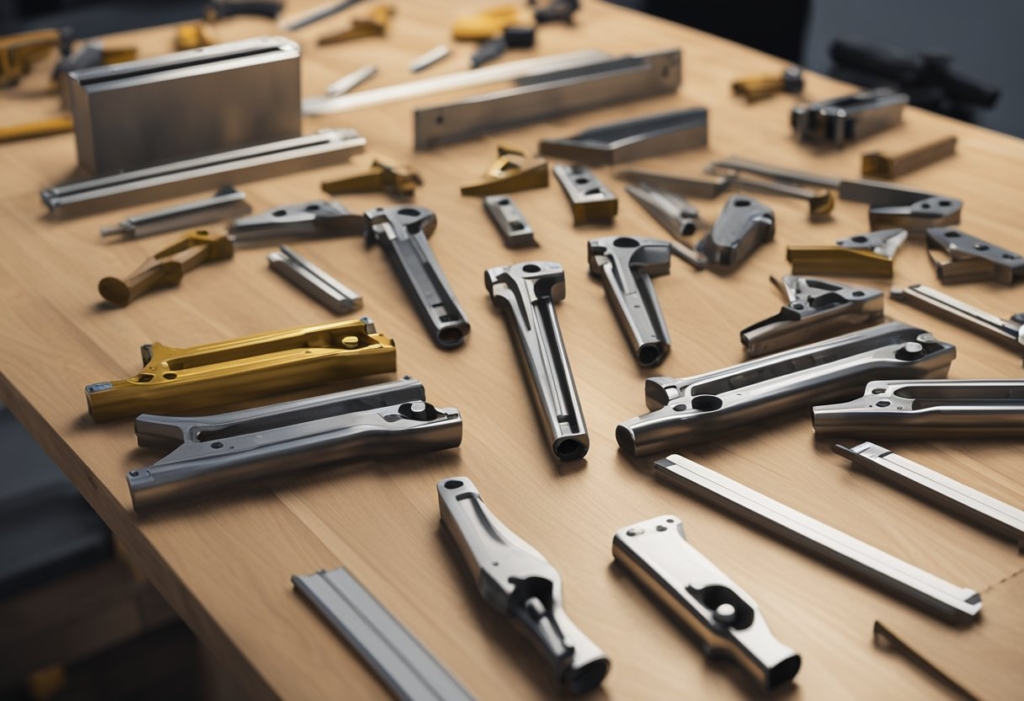When it comes to woodworking, choosing the right finish nailer can make all the difference.
The 15 gauge and 16 gauge finish nailers are two of the most popular options.
While they may seem similar, key differences between the two can affect the outcome of your project.
How to Choose A 15 Gauge or 16 gauge Finish Nailer – What’s The difference?
The main difference between 15 gauge and 16 gauge finish nailers is the thickness of the nails they shoot.
15 gauge nailers shoot nails that are thicker and have a larger head than 16 gauge nailers.
As a result, 15 gauge nails have more holding power and are less likely to split wood. They are also less likely to leave visible holes in the wood, which can be important for certain projects.
On the other hand, 16 gauge nailers shoot nails that are a little thinner than 15 gauge and have a smaller head.
Depending on the brand, these shoot nails from 3/4″ to 2-1/2″ inches long.
They have good holding power and are a good general-use guns.
Carpenters use them for a wide variety of tasks including interior trim, baseboard, and crown.
If you’re working with delicate materials that are prone to splitting, a 15 gauge nailer may be the better choice.
However, if you’re working on a project where the nail holes will be visible, a 16 gauge nailer may be a better option.
Key Takeaways
- Choosing the right finish nailer can greatly impact the outcome of your woodworking project.
- 15 gauge finish nailers use thicker nails and provide better holding power, making them ideal for larger, heavier trim pieces.
- 16 gauge finish nailers use thinner nails and are better suited for smaller, more intricate trim work.
Applications And Material Compatibility
When it comes to choosing between a 15 gauge and a 16 gauge finish nailer, understanding the applications and material compatibility is crucial.
Here, we will discuss the suitability of both types of nailers for different types of trim work, doors and windows, furniture, and woodworking projects.
Suitability for Trim Work
Both 15 gauge and 16 gauge finish nailers are suitable for trim work.
However, 15 gauge nailers are more suitable for thicker trim pieces, such as baseboards, crown molding, and interior trim.
16 gauge nailers are ideal for thinner trim pieces, such as door and window casings, exterior trim, and paneling.
Best for Doors and Windows
When it comes to doors and windows, 15 gauge finish nailers are the best choice. They offer more holding power and are less likely to split the wood. They are also suitable for hanging doors and installing door casings.
However, 16 gauge finish nailers can also be used for installing door and window casings and are a good choice for thinner trim pieces.
Ideal for Furniture and Woodworking Projects
For furniture and woodworking projects, 16 gauge finish nailers are the ideal choice.
They are perfect for joining pieces of wood together and can be used for assembling cabinets, chairs, tables, and other furniture pieces.
They are also suitable for installing trim on furniture pieces.
Material Compatibility
15 gauge and 16 gauge finish nailers can be used with a variety of materials, including
- Hardwoods
- Softwoods
- MDF
- Plywood
However, it is important to choose the right gauge and nail length depending on the thickness of the material being used.

The DEWALT D51257K is lightweight and has a no-mar pad to protect your surface from any damage. It’s accurate and precise, ideal for a new DIYer or a professional carpenter thanks to the internal piston catch which delivers even, maximum power with each shot.
Ease of Use for DIY Enthusiasts and Carpenters
Both 15 gauge and 16 gauge finish nailers are easy to use for DIY enthusiasts and carpenters. However, there are a few differences between the two that may influence your decision.
16 gauge finish nailers are lighter and more compact than 15 gauge finish nailers.
This makes them easier to manoeuvre and use in tight spaces.
On the other hand, 15 gauge finish nailers are more powerful and can handle thicker materials. This makes them ideal for heavy-duty carpentry work.
16 gauge finish nailers are more versatile than 15 gauge finish nailers.
They can be used for a wider range of applications, including trim work, baseboards, and crown moulding. 15 gauge finish nailers, on the other hand, are best suited for heavier materials like hardwoods and thick trim.
Maintenance and Reliability
When it comes to maintenance and reliability, both 15 gauge and 16 gauge finish nailers are fairly easy to maintain and reliable.
However, there are a few differences between the two that may influence your decision.
16 gauge finish nailers require less maintenance than 15 gauge finish nailers.
This is because 16 gauge finish nailers use smaller nails that are less likely to jam or cause other issues.
15 gauge finish nailers, on the other hand, use larger nails that are more prone to jamming and other issues.
15 gauge finish nailers are generally more reliable than 16 gauge finish nailers.
This is because they are designed for heavy-duty work and can handle thicker materials. However, they do require more maintenance to keep them in good working order.
When choosing between a 15 gauge and a 16 gauge finish nailer, it’s important to consider factors like ease of use, versatility, maintenance, and reliability.
By weighing these factors carefully, you can choose the right finish nailer for your needs and ensure that your carpentry work is of the highest quality.

Technical Specifications
Nail Gun Power Options
When it comes to nail gun power options, there are two main types to choose from: cordless and pneumatic.
Cordless nail guns are powered by rechargeable batteries, making them more portable and convenient.
Pneumatic nail guns, on the other hand, require an air compressor to function. They are generally more powerful and can handle larger nails, making them a better choice for heavy-duty applications.
Nail Diameter and Length
The diameter and length of the nails you can use with a finish nailer will depend on the gauge of the nail gun.
A 15g finish nailer uses nails that are slightly thicker than those used by a 16g finish nailer. The nails themselves are close to the same length, averaging ¾″ up to 2 ½″, although the 1 ¼″ to 2 ½″ range is most widely available.
The 16GA nails have sufficient holding power for interior trims and do not create quite the dent or hole of a 15GA nail.
Weight and Handling
The weight and handling of a finish nailer is an important consideration, especially if you will be using it for extended periods of time.
A 15g finish nailer is generally heavier than a 16g finish nailer due to the thicker nails it uses.
However, a 15g nailer has excellent holding power, and is a bit heavier than the 16g model.
Many people consider a 15g nailer to be similar to a framing nailer in terms of power and build.
If you are looking for a lighter and more manoeuvrable option, a 16g finish nailer may be a better choice.

The Hitachi NT65MA4 is a versatile and useful finish nailer. You can switch between sequential or contact modes with the flip of a switch. Sequential requires you to depress the tip and pull the trigger to drive each nail while contact automatically drives a nail each time the tip makes contact.
Accessory Compatibility
When it comes to accessory compatibility, both the 15 gauge and 16 gauge finish nailer are quite similar.
However, there are a few key differences that you should be aware of.
Compatibility with Hoses and Compressors
Both 15 gauge and 16 gauge finish nailers require a compressor to operate.
The size of the compressor required can vary depending on the nailer gauge.
Generally, a 15 gauge finish nailer requires a larger compressor than a 16 gauge finish nailer.
This is because 15 gauge nails are thicker and require more force to be driven into the material.
It’s also important to note that the size of the hose used with the nailer can affect performance.
A larger hose can allow for greater airflow, which can improve the overall performance of the nailer. But this can also be more cumbersome and difficult to maneuver.
Nail Size and Variety
Another important consideration when it comes to accessory compatibility is nail size and variety.
Both 15 gauge and 16 gauge finish nailers are compatible with a variety of nail sizes.
15 gauge finish nailers are capable of driving nails up to 2-1/2 inches in length.
While 16 gauge finish nailers are typically limited to nails no longer than 2 inches.
Additionally, 15 gauge finish nailers are capable of driving thicker nails than their 16 gauge counterparts.
Overall, both 15 gauge and 16 gauge finish nailers are compatible with a wide range of accessories, including hoses, compressors, and nails.
It’s important to choose the right size and variety of accessories to ensure optimal performance.

Frequently Asked Questions
What are the primary applications for a 15 gauge finish nailer?
A 15 gauge finish nailer is ideal for applications that require a stronger and thicker nail, such as installing baseboards, crown molding, and door and window casings. It is also suitable for attaching thicker trims and panels to walls.
In what scenarios is a 16 gauge finish nailer considered the optimal choice?
A 16 gauge finish nailer is a better choice when you need to attach thinner trims and moldings. It is also ideal for applications that require a smaller hole, such as attaching delicate trims and moldings.
Is it possible to interchange nails between 15 gauge and 16 gauge nail guns?
No, it is not possible to interchange nails between 15 gauge and 16 gauge nail guns. This is because the nails have different diameters and cannot fit into the other nail gun.
What are the differences in thickness between 15 gauge and 16 gauge nails?
15 gauge nails are thicker than 16 gauge nails. The thickness of a 15 gauge nail is about 1.8mm, while that of a 16 gauge nail is about 1.6mm.
For installing baseboards, should one opt for a 15 or 16 gauge nailer?
For installing baseboards, a 15 gauge nailer is the recommended choice. This is because baseboards require a stronger and thicker nail to hold them in place.
Which finish nailer gauge is recommended for most trim and baseboard work?
For most trim and baseboard work, a 15 gauge finish nailer is recommended. However, if you are working with delicate trims and moldings, a 16 gauge finish nailer may be a better choice.
Lorem ipsum dolor sit amet, consectetur adipiscing elit. Ut elit
Reader Interactions